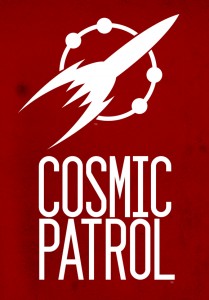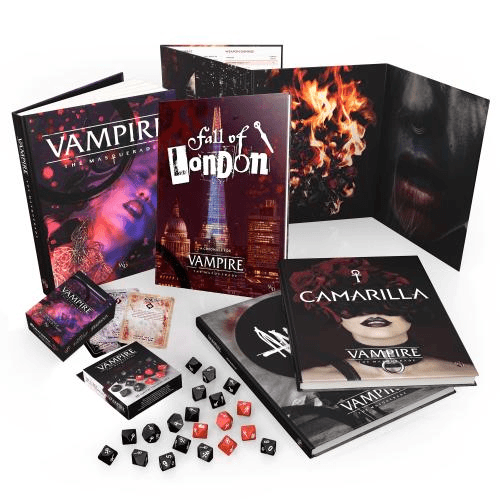Cosmic Patrol
Cosmic Patrol is a complete pulp sci-fi role-playing game written by Matt Heerdt, Randall Bills, and Jason Schmetzer and published by Catalyst Game Labs.
By Aaron T. Huss

Learn more about Cosmic Patrol here
Purchase Cosmic Patrol here
Find other Cosmic Patrol products here
Cosmic Patrol is a storytelling game set in a pulp sci-fi setting. You may say that “aren’t all role-playing games ultimately storytelling games?” While this is pretty much true, Cosmic Patrol is solely focused on the characters and the story they create. How is this done? By removing the Game Master and giving everyone the chance to tell the story according to the plot hooks that are laid out for that adventure. This is a big thing as Cosmic Patrol is meant to be more of an improvisational game whereas all you know is a description of the adventure’s framework, but everything inside is determined by whomever turn it is to be the Lead Narrator (the one taking the head spot for that particular narration). The key here is that the Lead Narrator is also a player and also telling their own story in regards to the adventure’s framework. The end result is an experience in collective narration creating a game that is not only fun, but extremely flexible in terms of how you want the setting to look and feel.
The basics of Cosmic Patrol are to use building blocks and plot points to create the story, continue moving it forward, and give players and the Lead Narrator the chance to do something spectacular. These elements are done on a narrative basis using things like cues to describe your character instead of just abilities and skills. But when the dice need to roll, there are basic abilities to aid resolution (for things like firing a weapon). When the dice are called upon, it is a simple base die (d12 or your Combat Stat Die) plus the applicable stat die and modifiers. Using a progressive die system, characters’ stats are defined by the die type, increasing as they “improve.” This, however, is only when the dice need to be rolled for particular resolutions, otherwise everything is done in narrative. It’s a simple system and quite visual (you’ll have to read about the armor and health system as they really can’t be summarized).
CONTENT
One Million and One: Cosmic Patrol opens up with a bit of fiction, taking place in a pulp sci-fi environment. It is a story-styled representation of what type of game-play is possible with Cosmic Patrol and manages to introduce some of the flavor elements within the setting.
Prelude is your introduction to role-playing and Cosmic Patrol. It includes that basics of what you need and a look at what’s different about Cosmic Patrol.
Gazetteer is an explanation of the setting including a timeline, a look at spaceships, information about the cosmos, and a list of the major locations within the star system and how they came to be. Additionally, the different races that appear within the Cosmic Patrol setting are introduced and given a brief explanation of.
By the Book contains the actual game mechanics with the primary focus being character creation (they are, after all, the main focus of the game). As the game is meant to focus on storytelling, information is provided regarding how to build the story and how it breaks down into different elements (such as scenes, missions, and campaigns). Here you learn all about what is used to develop the Cosmic Patrol game story through the use of cues and plot points (points that are used to make things more interesting) along with what happens when you actually need to roll the dice for resolution.
Heroes & Villains contains a collection of pregenerated characters to use as PCs, NPCs, or just plain adversaries. Each one contains a small description along with a full listing of cues and disposition plus their stats, armor, and health already calculated.
Blast Off! is a collection of seven ready-made adventures given in fairly vague terms. They all include objectives, cues, and tags (one- to three-word descriptions of different story elements) to provide direction in telling that game’s story. The setting is provided along with a statement about the different scenes in regards to enemies or obstacles.
OVERALL
Cosmic Patrol is a great blend of storytelling and dice rolling that focuses very heavily on the characters and the adventure they have. The removal of a Game Master and taking turns as the Lead Narrator mean that everyone involved in the game is fully involved and able to drive the story in new and interesting ways. The pulp sci-fi setting means that the sky’s the limit and you can really go any direction desired with a large amount of flexibility.
RATINGS
Publication Quality: 9 out of 10
Cosmic Patrol is designed as a simple but pleasing book. The layout and formatting are very simple and there is little to no “flash” throughout. The art within only covers the different character types (PC and NPC), but provide a nice collection of flavor that really represents the genre. The book is extremely easy to read and the content flows quite nicely from beginning to end. I would have liked to see some pulp sci-fi art covering spaceships (because that can be a big part of the genre too), but what was included look excellent.
Mechanics: 8 out of 10
Cosmic Patrol is a role-playing game and heavily leans toward storytelling elements. It does not focus on dice rolling outside of very specific situations and requires the players to be as involved with the game as the Lead Narrator. The removal of the Game Master means that the storyline could follow the adventure’s direction properly or end up somewhere in outer-space (figuratively and literally). The use of cues, objectives, and tags for this type of game-play is excellent for storytelling games, but what if you end up with a player that tries to take everything way off the farm? Sometimes giving everyone an equal amount of power can backfire, but with the right gaming group, Cosmic Patrol can produce hours of wonderful role-playing experiences and lots of great stories to be told.
Desire to Play: 10 out of 10
For those looking for a story-heavy role-playing game, Cosmic Patrol is an excellent blend of simplicity, flexibility, and narration. I feel that a story-telling game such as this works extremely well in the pulp sci-fi realm (given its inherent fantastical appearance and virtually impossible scientific feats), blending the game’s mechanics perfectly with the setting. Take this game into another genre, and it may not be as exciting, but pulp sci-fi really allows the mind to be as creative as possible. If you’re going to tell a story, this is a great place to do it without forcing the players to roll the dice or make mechanical decisions.
Overall: 9 out of 10
Cosmic Patrol truly fits in with the storytelling crowd. It will be interesting to see what directions the game takes in future supplements, but for now there is a solid base to start from and an excellent amount of material to get your games running. I can see these types of games being extremely popular at conventions and random gamer gatherings with its ease of understanding and the ability to provide flexibility to the players and the Lead Narrator without being bogged down in rules.



